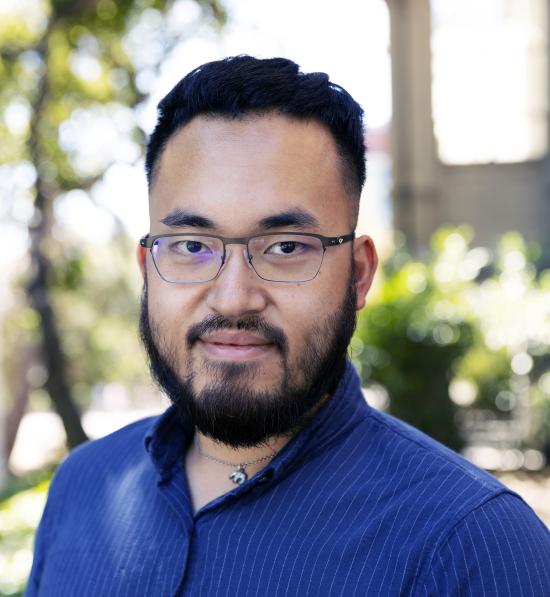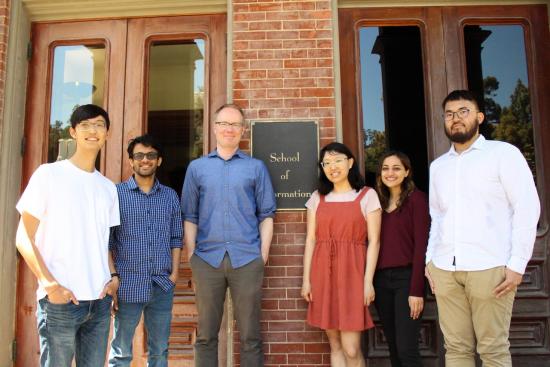Kent Chang is currently pursuing a Ph.D. in information science from the School of Information, advised by Assistant Professor David Bamman. His research focuses on natural language processing to understand and facilitate the process of meaning-making and social interaction in cultural texts, with particular interests in dialogue and narrative understanding. Prior to the I School, he was a predoctoral fellow at Carnegie Mellon University in the Department of Social and Decision Sciences. He also holds a bachelor’s in English language and literature from National Taiwan University and a master’s in digital humanities from University College London.
Why did you choose the I School and the Ph.D. program?
I wanted to work with Prof. David Bamman! Back when I was applying, his BookNLP was—still is—a staple in digital humanities and cultural analytics, and he was one of the very few professors who was actively publishing in both cultural analytics (CA) journals and top-tier natural language processing (NLP) conferences. In addition to his significant technical contributions to CA and NLP, he has the uncanny ability to think also in humanistic terms: for example, he maintains a distinction between referential gender and gender identity in his work. He’s the kind of scholar I wish to become myself.
What has been the most surprising thing about your experience here so far?
Before coming, I knew the I School was known for its interdisciplinary research and the abundance of collaborative opportunities with world-class researchers, and I still think that’s true, so no surprises there. What I do find surprising is how incredibly good our administrative staff is. I feel taken care of every time I reach out to them, and thanks to their support, I can focus on my research and studies. I also appreciate the opportunities to work with not just other Ph.D. students, but also our MIMS students and undergraduate students across campus. They’re amazing and I’ve learned so much from them.
What is an information challenge that intrigues you?
Information is such a capacious word! I’ll highlight two aspects that I’ve been thinking about more intensely of late:
As a researcher, I explore how we might offer an information-theoretic perspective on culture. Or, how can we build algorithmic measuring devices that can capture the nuance of language and culture and help us do close reading or describe long-term trends? In the most recent wave of generative AI, ventriloquizers of Feynman might argue that ChatGPT, Sora, and the like can create, and therefore they understand. There may be some truth to it, but we need more rigorous experiments that directly target the analytical capabilities of such models.
As a graduate student instructor at the School, I wonder how we can best curate, synthesize, and teach knowledge when there’s an overabundance of information. My job has led me to ask how we can better train new generations of interdisciplinary researchers in NLP and deep learning, among other things. I’d like to see more textbooks that, unlike an encyclopedia, you can and want to read from cover to cover, with only your pencil and paper. Back in undergrad, I thoroughly enjoyed Peter Ladefoged and Keith Johnson’s excellent textbook, A Course in Phonetics. It helps you build intuitions for key concepts, provides a cohesive perspective while presenting a comprehensive introduction to the subject, and is engaging and interactive—all in just under 300 pages. It also ages quite well.
What does Pride/Pride Month mean to you? Do you recognize or celebrate it? If so, how?
The historical aspect of queer culture is always important to me, so for me, it’s a time to reflect on where we are and where we started. As I look back, I see Larry Kramer and his Ned Weeks in The Normal Heart: “The only way we’ll have real pride is when we demand recognition of a culture that isn’t just sexual.” Recently, Nymphia Wind, having emerged victorious in RuPaul’s Drag Race, performed at Taiwan’s presidential office. For me, Pride means to appreciate such culturally and historically significant moments. As a theater nerd of some sort, my celebration also always includes watching the Tonys (and I get to adore the impeccable Ariana DeBose again this year) and attending local performances.
You recently received the Paul Fasana LGBTQ Studies Fellowship for your research studying queer culture using machine learning, particularly in movies, TV, and literary novels. Why do these topics interest you and how have you pursued these interests?
In his important ethnography work Geisha of a Different Kind, C. Winter Han sets out to explore “the cultural artifacts, such as meeting minutes, magazines, books, television shows, movies, and live performances that make up the everyday world of gay Asian American men” to “capture the thick description of the social context and the social realities that shape the lives of gay Asian American men.” I share a similar impulse and see those cultural artifacts as a crucial site for understanding queerness as a form of cultural sensibility, where queer people see themselves and find each other.
In Gaga Feminism, published in 2012, Jack Halberstam asks how “our ideas of family, desire, the normal, the ordinary, the extraordinary” might have changed when “everything else around us shifted, evolved, developed, and collapsed” since the turn of the century. SpongeBob Square Pants and Nemo, among others, make a presence as Halberstam explores the question, but I, taking inspiration from Richard So, Ted Underwood, and Andrew Piper, want to see if we can characterize those changes through computational models and other NLP methods.
TV and movies strike me as particularly interesting for this work. In 1989, a bed scene in Thirtysomething where “two men casually shared a smoke, discussed their morning routines, and talked about friends who had died of AIDS” reportedly “cost ABC $1.5 million in ad revenue” (taken from Ron Becker’s Gay TV and Straight America). In 2019, the first edited volume on queerbaiting was published under the editorship of Joseph Brennan, the reboot of Queer Eye went to Japan, and Trans in America won a News and Documentary Emmy. How has the cultural representation of queerness changed in between those years? What are the subcultural strategies involved? In studying queer culture, my goal is, once again using Ned Weeks’ words, to “claim it, and identify who was in it, and articulate what’s in our minds and hearts and all our creative contributions to this earth.” A fuller account of my vision, both theoretical and methodological, for this work can be found in my essay, “The Queer Gap in Cultural Analytics” (published in Debates in Digital Humanities 2023).
One last aspect of this work I will highlight here is how it seeks to queer disciplinary boundaries. If you encounter a paper on modernism or Foucault, you are unlikely to see “automatic differentiation” or “dynamic programming” mentioned anywhere. That may be the norm, and there’s nothing wrong with it, but the binary fiction of qualitative/quantitative, much like male/female, limits our thinking and has the potential to be queered. In this light, I feel fortunate to be part of the I School, where my thoroughly queer project is appreciated and rewarded.
What advice would you give an incoming or prospective Ph.D. student?
I don’t think I’m in the position to give any advice, but I’d be happy to share three non-academic books that are not explicitly about life in academia, but have nevertheless helped me so much during my Ph.D.:
The first one is Melody Beattie’s Codependent No More. Codependency is, to a certain extent, stigmatized, and so is the genre of self-help books. But if you’re willing to set that aside, you’ll see that this book is ultimately about creating boundaries so you can assuredly become yourself, and that for me is the hardest part about doing a Ph.D. you must learn and practice on your own.
Next up, I have Thanks for the Feedback by Sheila Heen and Douglas Stone. We always get a lot of feedback, and yet we are rarely taught how to adequately process it. While I’m not endorsing the arguments laid out in the book, it has taught me an important lesson: you can intellectualize feedback, which would distance you from it, and there’s benefit in that distancing.
Finally, I found Bent Flyvbjerg and Dan Gardner's How Big Things Get Done quite enlightening. It helps cultivate a mindset and a skillset for project management. It shows you the good and bad decisions a person or a team can make in planning and executing a project. The stories and the empirical data presented in the book are intriguing.
If you’re not a book person, I believe the following musical numbers can strike similar notes: “Show Yourself” (Idina Menzel, from Frozen II), the concluding reprise of “Don’t Rain On My Parade” (Barbra Streisand, from Funny Girl), and “Wait for It” (Leslie Odom Jr., from Hamilton).
Support students like Kent with a gift to the Paul Fasana LGBTQ Studies Fellowship. This fellowship supports UC Berkeley School of Information graduate students with research interests or studies in LGBTQ studies across any field or discipline and celebrates the legacy of Paul Fasana, M.L.S. ’60 (1933–2021).













